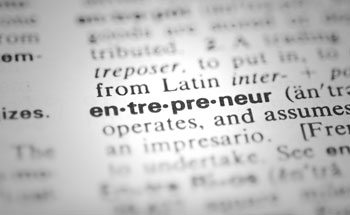
Entrepreneur
Is there a difference between being a business owner and entrepreneur? Some might say entrepreneurs are the greater fool.
First used in 1723, today the term entrepreneur implies qualities of leadership, initiative and innovation in manufacturing, delivery, and/or services. Economist Robert Reich has called team-building, leadership and management ability essential qualities for the entrepreneur The successful companies of the future, he has said, will be those that offer a new model for working relationships based on collaboration and mutual value.
 The entrepreneur is a factor in microeconomics, and the study of entrepreneurship reaches back to the work in the late 17th and early 18th centuries of Richard Cantillon and Adam Smith, which was foundational to classical economics.
The entrepreneur is a factor in microeconomics, and the study of entrepreneurship reaches back to the work in the late 17th and early 18th centuries of Richard Cantillon and Adam Smith, which was foundational to classical economics.
In the 20th century, entrepreneurship was studied by Joseph Schumpeter in the 1930s and other Austrian economists such as Carl Menger, Ludwig von Mises and Friedrich von Hayek. The term “entrepreneurship” was coined around the 1920s, while the loan from French of the word entrepreneur itself dates to the 1850s. It became something of a buzzword beginning about 2010, in the context of disputes which have erupted surrounding the wake of the Great Recession.
Is there a difference between being a business owner and entrepreneur?
Some might say entrepreneurs are the greater fool.
“The Greater Fool is … a patsy. For the rest of us to profit, we need a greater fool, someone who will buy long and sell short. Most people spend their lives trying not to be the greater fool; we toss in the hot potato, we dive for his seat when the music stops. The greater fool is someone with the perfect blend of self-delusion and ego to think that he can succeed where others have failed. This whole country was made by greater fool”
 The greater fool theory states that the price of an object is determined not by its intrinsic value, but rather by the often irrational beliefs and expectations of market participants. A price can be justified by a rational buyer under the belief that another party is willing to pay an even higher price. Or one may rationally have the expectation that the item can be resold to a “greater fool” later.
The greater fool theory states that the price of an object is determined not by its intrinsic value, but rather by the often irrational beliefs and expectations of market participants. A price can be justified by a rational buyer under the belief that another party is willing to pay an even higher price. Or one may rationally have the expectation that the item can be resold to a “greater fool” later.
The entrepreneur starts out of love, passion, inspiration, maybe some spark of genius and many, many times frustration. Often the frustration can become an idea and that idea becomes a company. Company’s can mature.
Only 30% of the businesses started by entrepreneurs survive to the second generation. The next generation is not always inspired or passionate the way the founder was. 65% of the US GDP comes from family owned businesses.
Some might say first generations, founders are the greater fool.
“The Greater Fool is … a patsy. For the rest of us to profit, we need a greater fool …

Leave a Reply